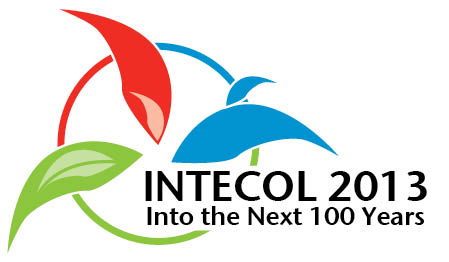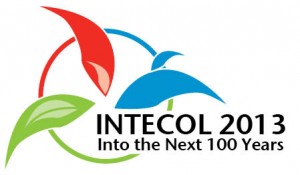- Bees: common myths and misunderstandings - 20/05/2020
- Worthless wetland? - 26/09/2019
- World Bee Day 2019 - 20/05/2019
Reflections on geeking it up at Intecol 2013 by Jane Stout
Having not been to a 2000+ delegate, multi-session, international conference for several years, I was a bit nervous in the run up to INTECOL2013 “Into the next 100 years: advancing ecology and making it count” – would it be possible to see all the talks, read all the posters and meet all the people I planned to? (Answer: no). Would I remember everyone and would anyone remember me from past meetings? (Answer: some yes, some no – thank goodness for name tags). Could I follow in the footsteps of Katie Taylor, the last girl from Bray to take the stage at the London ExCeL Arena, and take the Olympic gold? (Answer: no; note to self: must try harder). But I needn’t have worried – INTECOL 2013 was excellent: it was well organised, the quality of the science was top-notch, the sun shone, and the whole thing was very inspiring and humbling.
First off, there were some excellent plenaries. Georgina Mace’s talk on “Looking forwards not backwards: Biodiversity conservation in the 21st century” was particularly lucid and inspiring, even though one of the things that I remember best was when she did look backwards, at what she termed the four “ages of conservation”: 1. Nature for itself (all about protected areas, species, populations), 2. Nature despite people (all about the terrible things humans have done to nature – threats and drivers – I think this was more or less when I started my BSc), 3. Nature for people (ecosystem function, ecosystem services) and 4. People and nature (about changes and dynamics, involving more socioeconomics etc.). She highlighted that conservation focus has moved fast but the science has not necessarily kept up. And that extremes not averages may matter more in the future.
Bill Sutherland’s plenary on “How do we improve decision making?” was also really good – he talked about how (not) to make decisions and stressed that good scientific evidence was not only fundamental, but needed to be effectively communicated in order to be taken into account. He also highlighted some research into so-called “experts” which was fascinating (see Bergman et al. 2011). The panel discussion following Bill’s talk was really good, especially as it was effectively and humorously chaired by Professor Sue Hartley (Director – York Environmental Sustainability Institute). Having Bob May describe his position as the first Chief Scientist to the UK government was really interesting – and made me realise how great it would be if we had a similar position here in Ireland.
David Tilman managed to pull a plenary talk out of the bag at <48hrs notice, which was not only impressive in itself, but also an excellent talk. He described some of the findings from the Cedar Creek biodiversity plots which show the importance of biodiversity (“I knew biodiversity was going to be important, what I hadn’t realised was just how important”) and talked about how it wasn’t necessary to trade biodiversity off against food production – we just all need to eat less meat. He suggested that we all to invite friends round and cook vegetarian food (try this veg curry!).
Aside from the plenaries, there were heaps of really interesting talks. There were so many good titles that there wasn’t a hope of seeing everything that I wanted to. The thing that amazed me was how many pollination related talks there were. The last time I went to a conference like this there was maybe half a dozen pollinator talks. At this meeting there were at least 44 oral presentations with something to do with pollination or bees in the title. Hardly surprising given all the media hype associated with bee decline, but great to see how this field has grown in the past 10 years.
I was fortunate enough to speak in the symposium “Threats to an ecosystem service: evaluating multifactorial pressures on insect pollinators”, which included a really excellent introduction by Claire Kremen, who described, among other things, almond pollination in the US – millions of honeybee colonies are shipped into California from all over the country to pollinate almonds because there are no wild bees left in the orchards. One of the things she’s working on is introducing native wild plants in hedgerows into the landscape – made me realise how lucky we are here in Ireland with our complex landscapes full of hedgerows. Many of the other speakers in this session were talking about work they have done as a result of the Pollinator Initiative funding in the UK. There’s some excellent work going on there. The symposium was followed by a social event which apparently was sort of like speed dating but with “experts” moving around the room speaking to different people (who were mostly equally, if not more, expert themselves). Not sure whether it really worked, but there was a glass of wine in it for everyone (and no dating involved thankfully).
I saw some really nice presentations by current PhD students – some of my favourites were Alistair Campbell from Lancaster talking about enhancing beneficial insect communities and their services in cider apple orchards by planting flower strips; Gita Benadi from Wurzburg talking about her work on phenological synchrony between plants and pollinators and implications of shifts in either taxa with climate change; and Katherine Orford from Bristol talking about her work on how grassland management affects pollinator community diversity, function and biomass. Keep an eye out for their papers…
I didn’t manage to get to the BES birthday party, which was apparently great fun, but there were some great social interactions (shame about the beer – this part of London is so new there aren’t any decent pubs). We did take the cable car from the Excel Arena to the O2 Arena aka Millennium Dome and then a boat up the River Thames which was cool. And the sun shone! Happy geeky nerdy sunny ecology days…


